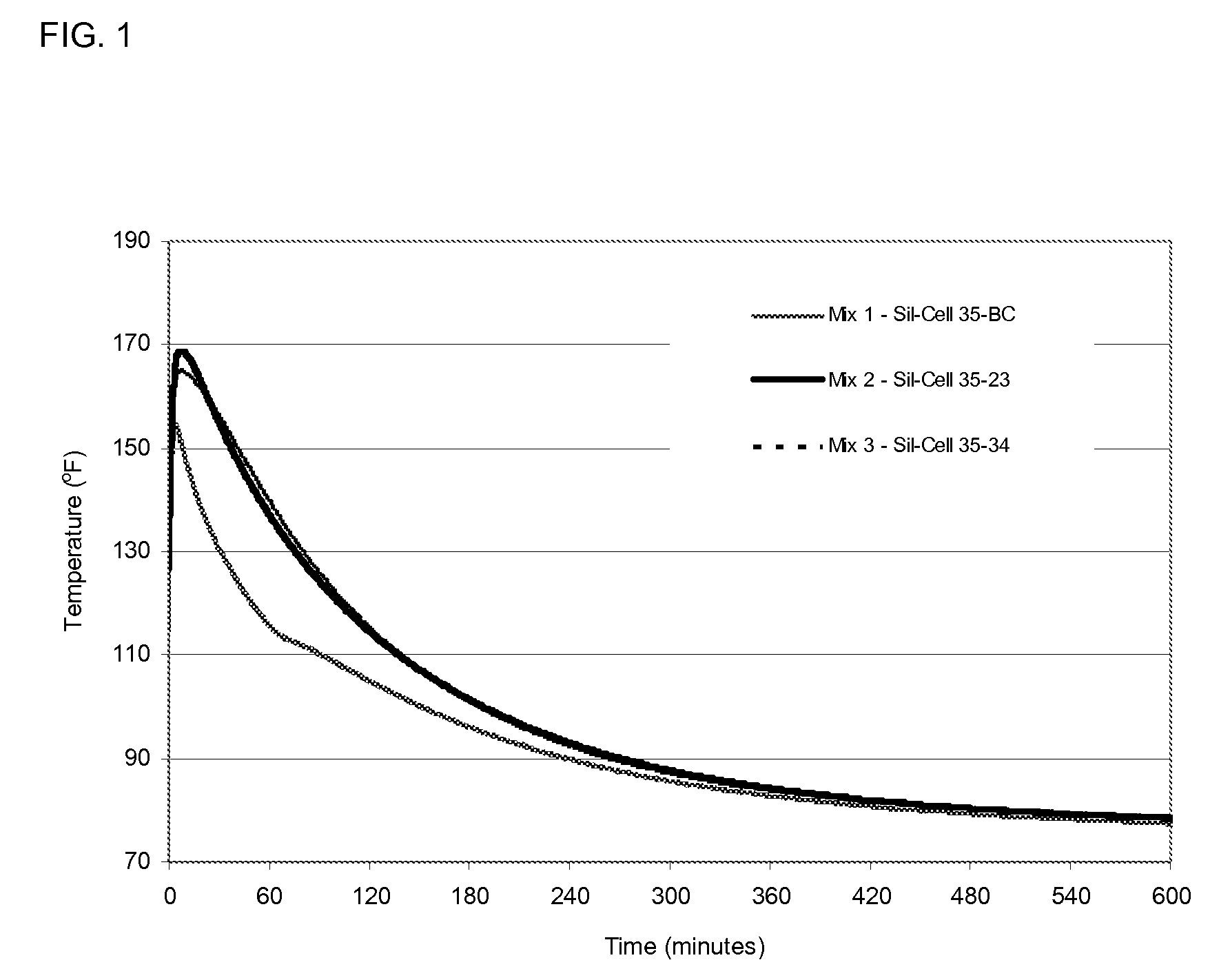Lightweight cementitious compositions and building products and methods for making same
- Summary
- Abstract
- Description
- Claims
- Application Information
AI Technical Summary
Benefits of technology
Problems solved by technology
Method used
Image
Examples
example 1
[0113]The following examples illustrates producing lightweight cement boards in a commercial manufacturing process using cementitious compositions of the invention. The raw materials used included a cementitious reactive powder of Portland cement Type III, class F fly ash, and calcium sulfate dihydrate (landplaster), chemically coated perlite, expanded clay and shale aggregate and added liquids. The liquids, e.g., triethanolamine, were admixtures added as aqueous solutions. In addition, sodium citrate and sulfonated napthalene superplasticizer were added to control the fluidity of the mixes. These admixtures were added as weight percentage of the total reactive powder.
[0114]TABLE 2 shows specific composition used to produce 0.5 inch (1.27 cm) thick lightweight cement panels having a density of about 56 pounds per cubic foot (pcf) (0.9 g / cc).
TABLE 2Example 1 lightweight cementitious compositionIngredientWeight %Volume %Portland cement-based binder47.814.4(cementitious reactive powder...
example 2
[0127]The following example illustrates producing lightweight cement boards in a commercial manufacturing process using cementitious composition of the invention. The raw materials used included a cementitious reactive powder of Portland cement Type III, class F fly ash, and calcium sulfate dihydrate (landplaster), chemically coated perlite, expanded clay and shale aggregate and added liquids. The liquids, e.g., triethanolamine, were admixtures added as aqueous solutions. In addition, sodium citrate and sulfonated napthalene superplasticizer were added to control the fluidity of the mixes. These admixtures were added as weight percentage of the total reactive powder.
[0128]TABLE 4 shows specific composition used to produce 0.5 inch thick lightweight cement panels having a density of about 60 pounds per cubic foot (pcf) (0.96 g / cc).
TABLE 4Example 2 lightweight cementitious compositionIngredientWeight %Volume %Portland cement-based binder47.815.2(cementitious reactive powder)1Chemicall...
example 3
[0136]The mesh reinforced cementitious panels from Example 2 were tested for their suitability as a substrate for bonding ceramic tiles. Quarry tiles were bonded to cement panels of Example 2 utilizing a latex modified cementitious thin-set mortar conforming to ANSI A118.4 standard. LATICRETE® 317 Floor N' Wall Thin Set Mortarwas mixed with LA TICRETE® 333 Super Flexible Additive to prepare the thin-set mortar for bonding tiles to cement board. The prepared specimens were cured for 28-days and tested per ANSI A118.10 standard to characterize shear-bond strength. TABLE 7 shows the shear-bond strength of the tested specimen. From the data, it can be observed that the specimen developed a shear-bond strength of 241 psi (1.66 MPa), which far exceeds the minimum shear-bond strength requirement of 50 psi (0.34 MPa) per ANSI A118.10 standard. This testing demonstrates that cementitious formulations and products of the invention develop extremely good shear-bond strength with ceramic tiles ...
PUM
| Property | Measurement | Unit |
|---|---|---|
| Temperature | aaaaa | aaaaa |
| Temperature | aaaaa | aaaaa |
| Temperature | aaaaa | aaaaa |
Abstract
Description
Claims
Application Information
 Login to View More
Login to View More - R&D
- Intellectual Property
- Life Sciences
- Materials
- Tech Scout
- Unparalleled Data Quality
- Higher Quality Content
- 60% Fewer Hallucinations
Browse by: Latest US Patents, China's latest patents, Technical Efficacy Thesaurus, Application Domain, Technology Topic, Popular Technical Reports.
© 2025 PatSnap. All rights reserved.Legal|Privacy policy|Modern Slavery Act Transparency Statement|Sitemap|About US| Contact US: help@patsnap.com

